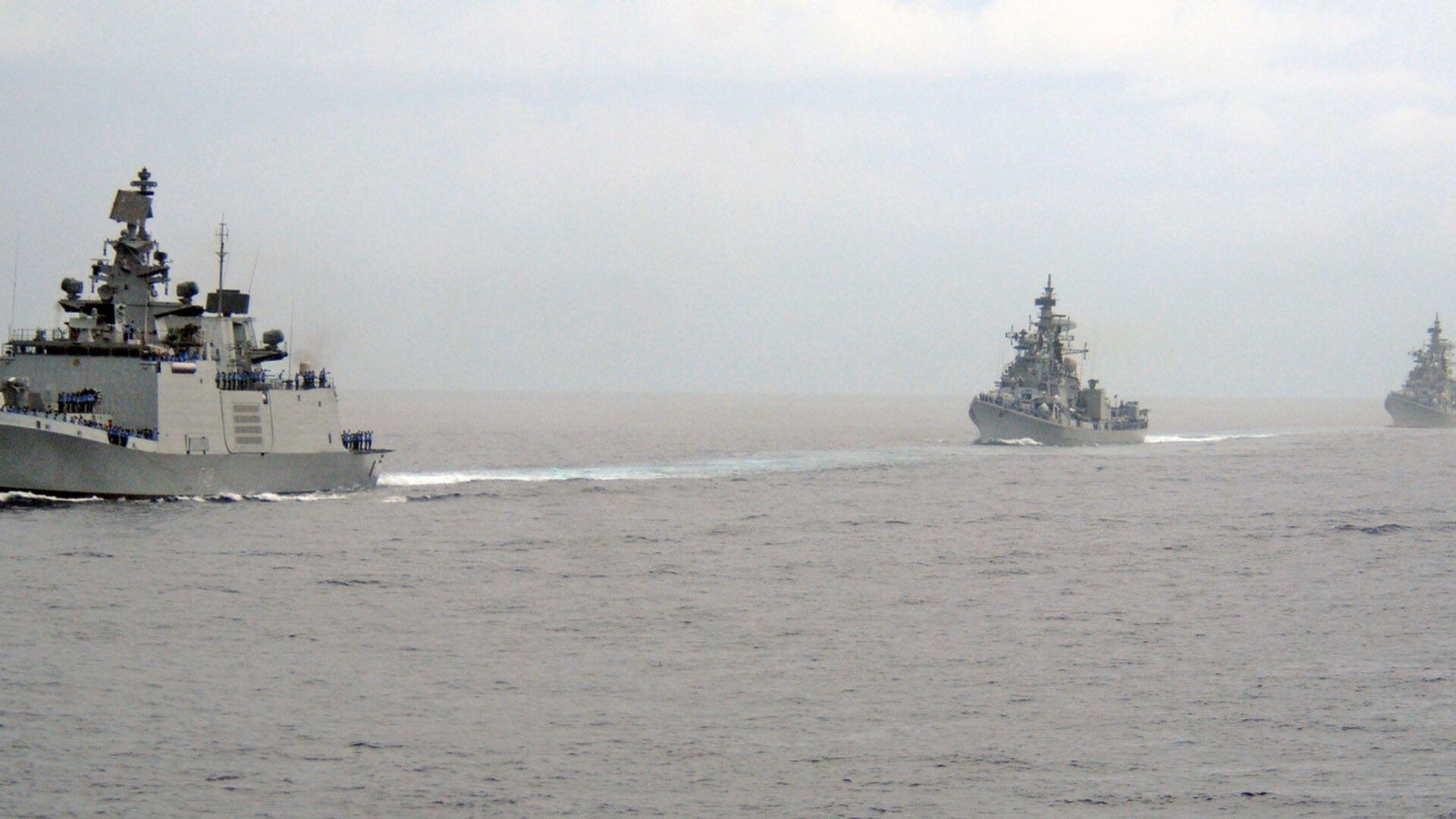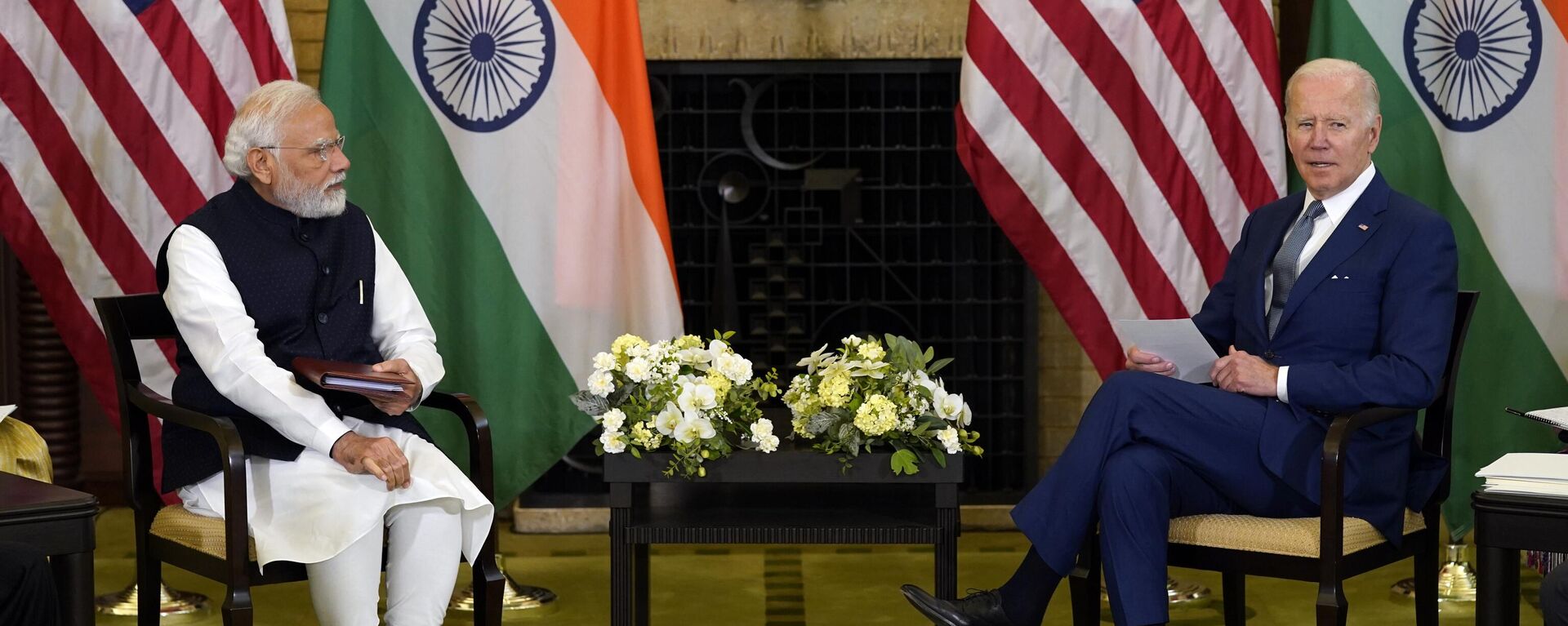https://sputniknews.in/20240214/desire-to-dominate-indian-ocean-determines-us-actions-in-region-6538120.html
Desire to Dominate Indian Ocean Determines US Actions in Region
Desire to Dominate Indian Ocean Determines US Actions in Region
Sputnik India
In spite of its expanding strategic ties with India, the US continues to work towards its stated ambition of being the predominant power in the Indian Ocean Region (IOR), in line with its global strategic goals,
2024-02-14T17:14+0530
2024-02-14T17:14+0530
2024-02-14T17:14+0530
sputnik opinion
india
us
new delhi
indian navy
arabian sea
indian ocean
bay of bengal
sri lanka
myanmar
https://cdn1.img.sputniknews.in/img/07e7/0b/10/5442250_251:0:1849:899_1920x0_80_0_0_9a29de42bd6dc51b6120df99042a46e4.jpg
The US continues to work towards its stated ambition of being the predominant power in the Indian Ocean Region (IOR), in line with its global strategic goals, an Indian Navy veteran has told Sputnik India.While US and other western navies carry out regular freedom of navigation patrols in the South China Sea and Taiwan Strait, a similar American Navy patrol in India's Exclusive Economic Zone (EEZ) near Lakshadweep in 2021 evoked concerns in New Delhi.Vasan went on to note that the US has been asking its partners and allies to complement its security efforts in the India Ocean and other areas, to serve the ultimate American policy objectives.The Indian Navy veteran reckoned that New Delhi may not be averse to such a proposal for the simple reason that it would like to stay ahead of the curve of the emerging geopolitical competition in the region.Vasan stated as far as India was concerned, its cooperation with the US in Indian Ocean would be "issue-based" rather than all-encompassing. He underlined that New Delhi has sent out a clear strategic signal to the US by not joining the US Navy-led coalition in the Red Sea in the wake of the Gaza conflict.India, US Differ in Outlook Towards the RegionThe former naval officer explained there were differences in the outlooks of India and the US in how they carry out their respective relations with the Indian Ocean littoral states.He asserts that one of the issues is the Israel-Hamas war, stressing that the US' policy in supporting the Israeli offensive was "isolated" from rest of the region.Focussing on the Bay of Bengal, another subregion in Indian Ocean, Vasan noted that American policy towards Bangladesh and Myanmar was at odds with India's."Bangladesh's opposition and its allies are inimical to India's interests and there is also a deep-rooted Islamic fundamentalism which has security implications for New Delhi. As far as US ties with such entities is concerned, I believe that there should an exchange mechanism between New Delhi and Washington so that we are in the loop of what exactly are American interests in engaging with such parties," Vasan opined.What is India Doing to Cement its Strategic Position in Indian Ocean?Besides being the first responder to any crisis, Vasan explained that one of the other priorities for the Indian Navy has always been to keep the sea lines of communication (SLOC) in the Indian Ocean open and secure.He stated that for New Delhi, "new contours" of challenges have emerged in the region because of growing influence of China, which in a way have driven closer US-India cooperation.
https://sputniknews.in/20230630/south-china-sea-tensions-will-spill-over-into-indian-ocean-warns-ex-indian-colonel-2756166.html
india
us
new delhi
arabian sea
indian ocean
bay of bengal
sri lanka
myanmar
saudi arabia
iran
uae
middle east
gulf countries
persian gulf (arabian gulf)
gaza strip
israel
lakshadweep
taiwan
south china sea
Sputnik India
feedback.hindi@sputniknews.com
+74956456601
MIA „Rossiya Segodnya“
2024
Dhairya Maheshwari
https://cdn1.img.sputniknews.in/img/07e6/0c/13/138962_0:0:641:640_100x100_80_0_0_2cb44360dbcdf6d84bf4b299cd045917.jpg
Dhairya Maheshwari
https://cdn1.img.sputniknews.in/img/07e6/0c/13/138962_0:0:641:640_100x100_80_0_0_2cb44360dbcdf6d84bf4b299cd045917.jpg
News
en_IN
Sputnik India
feedback.hindi@sputniknews.com
+74956456601
MIA „Rossiya Segodnya“
Sputnik India
feedback.hindi@sputniknews.com
+74956456601
MIA „Rossiya Segodnya“
Dhairya Maheshwari
https://cdn1.img.sputniknews.in/img/07e6/0c/13/138962_0:0:641:640_100x100_80_0_0_2cb44360dbcdf6d84bf4b299cd045917.jpg
indian ocean region, india us ties, india us relations, quad summit, china us war, china us tensions, indian ocean conference, indian ocean conference perth, rafah deaths, gaza crisis, bangladesh regime change, myanmar news, indo-pacific news, modi uae visit
indian ocean region, india us ties, india us relations, quad summit, china us war, china us tensions, indian ocean conference, indian ocean conference perth, rafah deaths, gaza crisis, bangladesh regime change, myanmar news, indo-pacific news, modi uae visit
Desire to Dominate Indian Ocean Determines US Actions in Region
New Delhi views itself as the "resident power" and the "first responder" in the Indian Ocean Region, a status is seeking to reinforce due to growing big power rivalry between China and the US.
The US continues to work towards its stated ambition of being the predominant power in the Indian Ocean Region (IOR), in line with its global strategic goals, an Indian Navy veteran has told Sputnik India.
Commodore (retired) Seshadri Vasan, the Director of Chennai-based think tank Centre for China Studies (C3S), highlighted that Washington has never "deviated from its global ambition of remaining the pre-eminent power across various zones", in line with successful American administrations’ policies.
"The US is present in the Indo-Pacific, including in the Indian Ocean Region and South China Sea, and in other areas which it deems to be contested and challenged by other powers. It will continue to carry out Freedom of Navigation Operations (FONOPs) in the region to reinforce its status of a global power with great relevance. The US will continue to honour its defence and force posture commitments and treaties," Vasan underscored.
While US and other western navies carry out regular freedom of navigation patrols in the South China Sea and Taiwan Strait, a similar American Navy patrol in India's Exclusive Economic Zone (EEZ) near Lakshadweep in 2021 evoked concerns in New Delhi.
"The US is never going to give up on its global ambitions in the region just because of India. One could expect the US to be pro-active in stalling any developments it believes will damage its credentials or standing in any region, and that includes the Indian Ocean," the Indian think tanker remarked.
Vasan went on to note that the US has been asking its partners and allies to complement its security efforts in the India Ocean and other areas, to serve the ultimate American policy objectives.
The Indian Navy veteran reckoned that New Delhi may not be averse to such a proposal for the simple reason that it would like to stay ahead of the curve of the emerging geopolitical competition in the region.
Vasan stated as far as India was concerned, its cooperation with the US in Indian Ocean would be "issue-based" rather than all-encompassing. He underlined that New Delhi has sent out a clear strategic signal to the US by
not joining the US Navy-led coalition in the Red Sea in the wake of the Gaza conflict.
"India doesn’t have to be seen as aligning with the US in the Indian Ocean Region. This is India's area of influence, with even the US being an extra-regional player," the expert asserted.
India, US Differ in Outlook Towards the Region
The former naval officer explained there were differences in the outlooks of India and the US in how they carry out their respective relations with the Indian Ocean littoral states.
He asserts that one of the issues is the Israel-Hamas war, stressing that the
US' policy in supporting the Israeli offensive was "isolated" from rest of the region.
"While New Delhi has condemned the attack against Israel as part of its zero-tolerance towards terrorism policy, it has been clear on its stance in supporting the creation of an independent state of Palestine. There is a distinction between condemning terrorism and not supporting actions which may come in the way of a two-state solution," Vasan said.
Focussing on the
Bay of Bengal, another subregion in Indian Ocean, Vasan noted that
American policy towards Bangladesh and Myanmar was at odds with India's.
"Bangladesh's opposition and its allies are inimical to India's interests and there is also a deep-rooted Islamic fundamentalism which has security implications for New Delhi. As far as US ties with such entities is concerned, I believe that there should an exchange mechanism between New Delhi and Washington so that we are in the loop of what exactly are American interests in engaging with such parties," Vasan opined.
What is India Doing to Cement its Strategic Position in Indian Ocean?
Besides being the first responder to any crisis, Vasan explained that one of the other priorities for the Indian Navy has always been to keep the sea lines of communication (SLOC) in the Indian Ocean open and secure.
"Indian presence in the region is not something new or because of the Gaza crisis. India has been readily available and been carrying out what one could describe as camping expedition deployments to stay relevant in areas of hotspots. As part of the strategy, India has identified eight areas and it has been regularly patrolling these waters. These include waters of central Indian Ocean, southern Indian Ocean, Bay of Bengal and the Strait of Malacca," the Navy veteran spelled out.
He stated that for New Delhi,
"new contours" of challenges have emerged in the region because of growing influence of China, which in a way have driven closer US-India cooperation.
"India has been expanding the scope of its multi-faceted cooperation with countries like Saudi Arabia and the UAE, including carrying out joint drills. Still, India would like to shape an independent course of foreign policy, as indicated by its growing engagements with Gulf countries," Vasan concluded.



